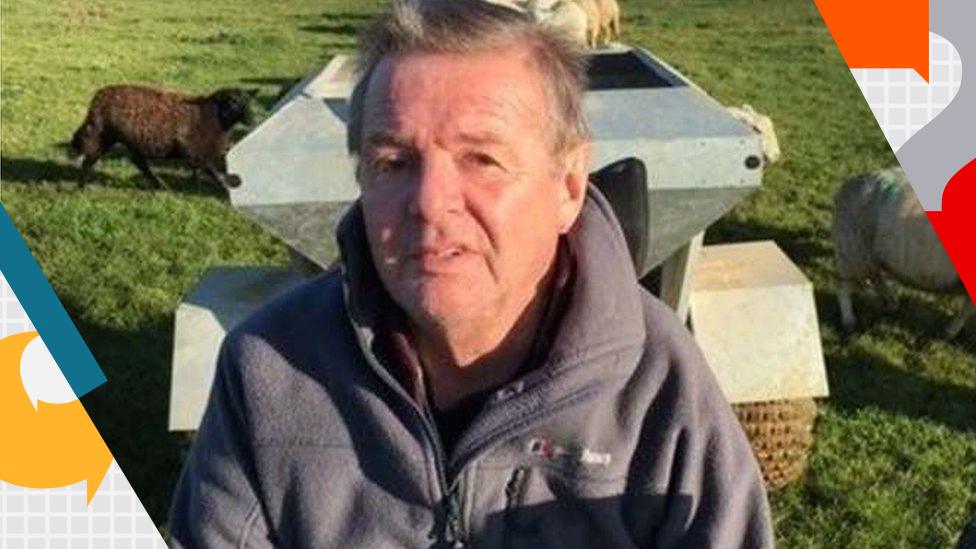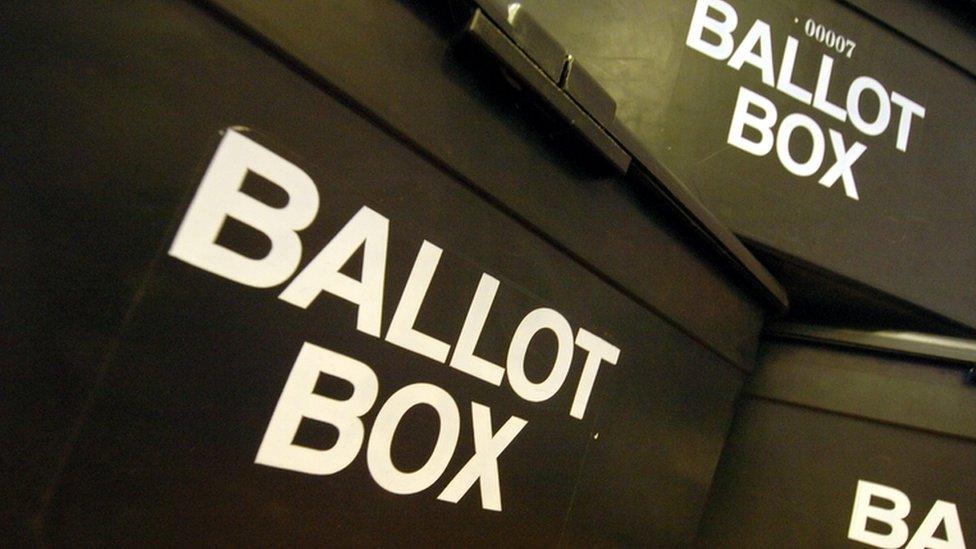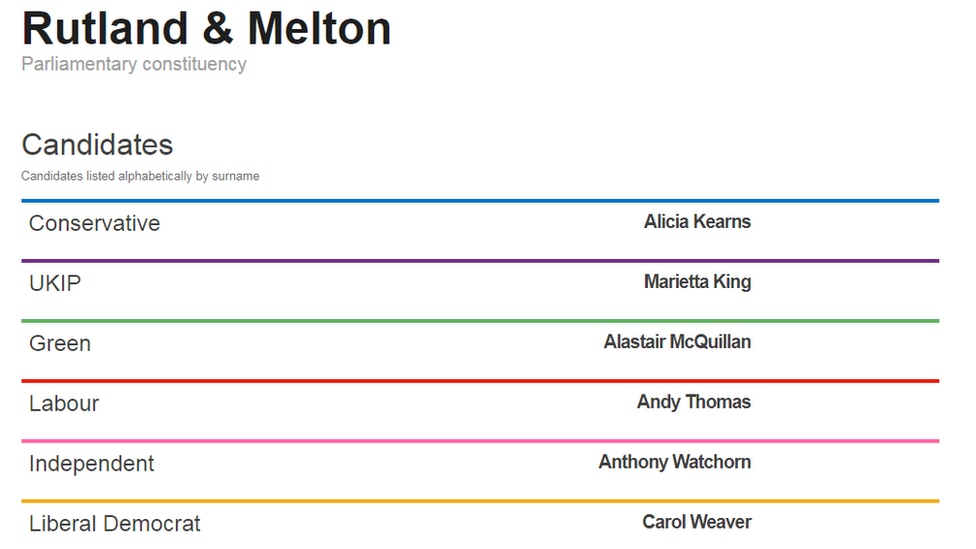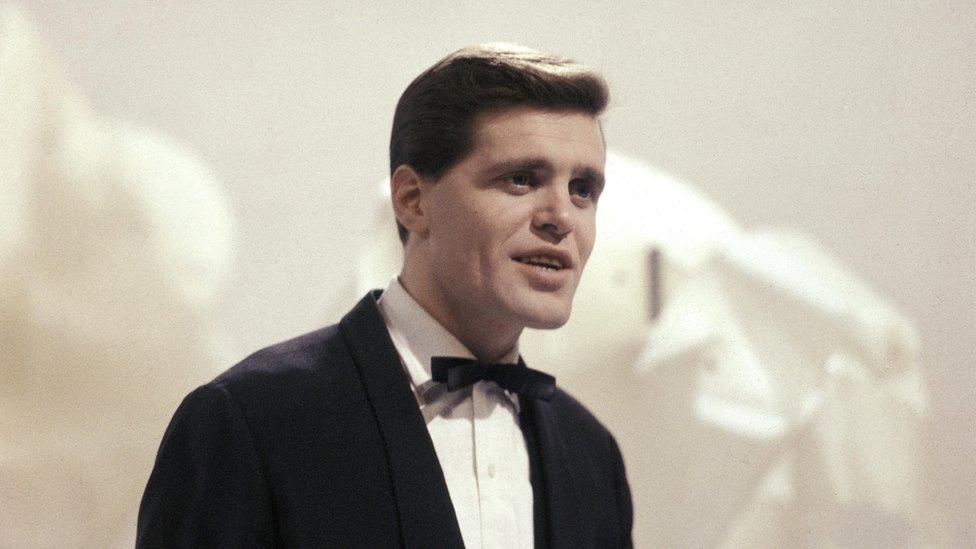General election 2019, Your Questions Answered: What happens if a candidate dies?
- Published

Anthony Watchorn was one of six candidates standing in Rutland and Melton
There was shock in the East Midlands constituency of Rutland and Melton last week when the death was announced of independent candidate Anthony Watchorn.
His family said the 69-year-old died in hospital after falling ill. He had been due to take part in a debate days afterwards.
With thousands of candidates standing across the country, deaths during an election campaign are rare but not unheard of. Connor from Edinburgh asked why independent candidates are treated differently from those who represent a political party when they die? To answer that, we need to go back a step.
Does the vote still go ahead?

A decision on whether to halt the election depends on who has died
The Electoral Commission's guidance for returning officers, external has pretty clear rules governing the death of a standing candidate.
These state that if the candidate was standing on behalf of one of the UK's 300-plus registered political parties, the election would stop and be rescheduled for a later date.
However, if the candidate was a pure independent - so just representing themselves rather than a party - the election would continue as normal.
Why the difference between party candidates and independents?
A spokesman for the Electoral Commission said the delay was to allow the party to put forward an alternative candidate, whereas a candidate standing as an individual could not be replaced.
Does that mean their name would remain on the ballot paper?
Yes it would, and in fact people may still vote for a deceased candidate. Chief executive for the Association of Electoral Administrators Peter Stanyon said: "There are practical implications, like the ballot papers may have already been printed, but technically the law doesn't allow a person's name to be taken off the ballot."
According to current legislation, the only way a person could be taken off the ballot would be by withdrawing from the election, which could be done up until 17:00 on nomination day.
Postal voters may have already cast their ballot before the candidate died and they would not get another vote.
What would happen if the dead candidate won the election?

Mr Watchorn's name will remain on voting papers
In the unlikely event of this happening, they would not be elected.
Instead the election would be re-run with the existing candidates still nominated. No new nominations would be allowed but candidates could withdraw.
Have people voted for dead candidates in the past?
Yes they have. In 2015, former Eurovision singer Ronnie Carroll died of a short illness just days after getting his name printed on general election ballot papers for the Hampstead and Kilburn constituency.

Ronnie Carroll represented the UK in the Eurovision Song Contest two years in a row - in 1962 and 1963
The 80-year-old picked up 113 votes to finish sixth out of seven candidates - Robin Ellison of The U(niversal) Party came last - but the seat went to Labour's Tulip Siddiq. Mr Carroll had finished fourth in both his Eurovision appearances, in 1962 and 1963.
What would happen if two people were standing and one died?
The Electoral Commission guidance says the election would be treated as an uncontested election and the other person elected.
And what if it was tied vote between a live candidate and a dead one?
The rules state the living person would be elected.
What happens to the deposit?
In all cases this would be returned to the person who had paid it or, if that person was the candidate, it would be returned to their "personal representative". In the case of a dead independent candidate who ended up in the ballot, it would be returned irrespective of whether they received the number of votes a living candidate would need to avoid losing their deposit.
What would happen if a candidate died when the polls had opened?
As before, if the candidate was independent the poll would continue as planned but if they were standing on behalf of a party, it would be immediately stopped and postponed.
The Electoral Commission makes it clear in its guidance that it would be the time the returning officer received proof of the candidate's death that was the key point, not the actual time of death.
So in theory a party candidate could die on polling day but if the returning officer had not received proof, the polls would remain open and the vote would stand.
If the winning candidate's death was subsequently confirmed, there would need to be a by-election, just as if they had died mid-term.


Use the form below to send us your questions and we could be in touch.
In some cases your question will be published, displaying your name and location as you provide it, unless you state otherwise. Your contact details will never be published. Please ensure you have read the terms and conditions.
If you are reading this page on the BBC News app, you will need to visit the mobile version of the BBC website to submit your question on this topic.

Follow BBC East Midlands on Facebook, external, Twitter, external, or Instagram, external. Send your story ideas to eastmidsnews@bbc.co.uk, external.
- Published27 November 2019

- Published6 November 2019
